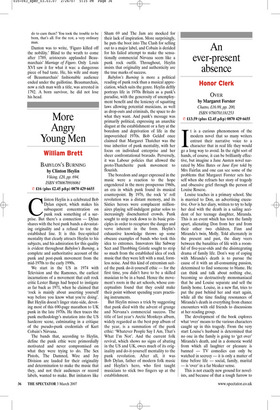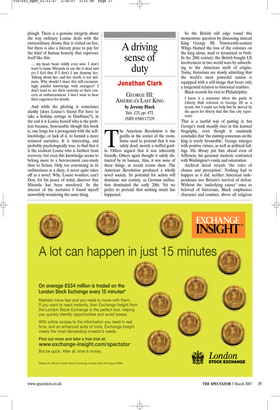An ever-present absence
Honor Clerk
OVER by Margaret Forster
Chatto, £16.99, pp. 200,
ISBN 9780701181253 ✆ £13.59 (plus £2.45 p&p) 0870 429 6655 It is a curious phenomenon of the modern novel that so many writers entrust their narrative voice to a character that in real life they would go a long way to avoid. In the right sort of hands, of course, it can be brilliantly effective, but imagine a Jane Austen novel narrated by Miss Bates or Jane Eyre told by Mrs Fairfax and one can see some of the problems that Margaret Forster sets herself when she refracts her story of tragedy and obsessive grief through the person of Louise Roscoe.
Louise teaches in a primary school. She is married to Don, an advertising executive. Over is her diary, written to try to help her deal with the death in a sailing accident of her teenage daughter, Miranda. This is an event which has torn the family apart, alienating Don from her and from their other two children, Finn and Miranda’s twin, Molly. Told alternately in the present and past, the diary veers between the banalities of life with a roomful of five-year-olds and the disintegrating drama of family life. Don’s way of coping with Miranda’s death is to pursue the cause of it with an all-consuming passion, determined to find someone to blame. He can think and talk about nothing else, becoming so destructively monomaniacal that he and Louise separate and sell the family home. Louise, in a new flat, tries to put the past behind her and start again, while all the time finding resonances of Miranda’s death in everything from chance encounters with old friends to discussions at her reading group.
The development of the book explores what ‘over’ means to the various characters caught up in this tragedy. From the very start Louise’s husband is determined that no one in the family is going to ‘get over’ Miranda’s death, and in a domestic world from which all laughter or pleasure is banned — TV comedies can only be watched in secrecy — it is only a matter of time before life — social, family, marital — is ‘over’ in a far bleaker sense.
This is not exactly new ground for novelists, and because of that a tough furrow to plough. There is a genuine integrity about the way ordinary Louise deals with the extraordinary drama that is visited on her, but there is also a literary price to pay for the kind of human honesty that expresses itself like this:
... my heart beats wildly even now. I don’t want to name Miranda or say she is dead and yet I feel that if I don’t I am denying her. Talking about her, and her death, is too intimate. Why should I share this still excruciatingly painful knowledge with strangers? I don’t want to see their curiosity or their concern or embarrassment. I don’t want to hear their eagerness for details.
And while the plotting is sometimes clunky (does Louise’s friend Pat have to take a holiday cottage in Dunblane?), in the end it is Louise herself who is the problem because, honourable though this book is, one longs for a protagonist with the selfknowledge, or lack of it, to furnish a more textured narrative. It is interesting, and probably psychologically true, to find that it is the resilient Louise who is farthest from recovery, but even this knowledge seems to belong more to a bereavement case-study than to fiction. Only too convincing in its ordinariness as a diary, it never quite takes off as a novel. Why, Louise wonders, can’t Don, for his peace of mind, discover that Miranda has been murdered. In the interest of the narrative I found myself unworthily wondering the same thing.











































































 Previous page
Previous page